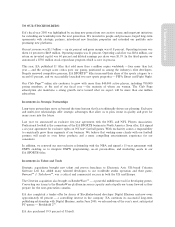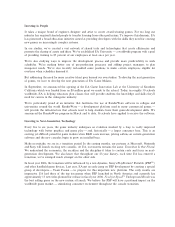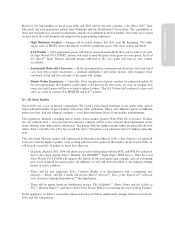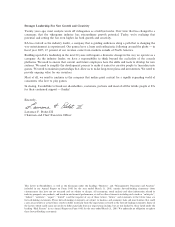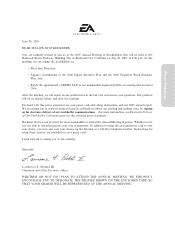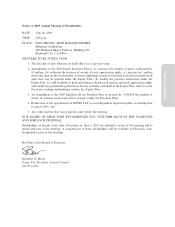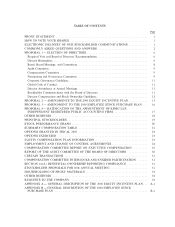Electronic Arts 2005 Annual Report Download - page 4
Download and view the complete annual report
Please find page 4 of the 2005 Electronic Arts annual report below. You can navigate through the pages in the report by either clicking on the pages listed below, or by using the keyword search tool below to find specific information within the annual report.Investing in People
It takes a unique brand of engineer, designer and artist to create award-winning games. For too long our
industry has required talented people to transfer learning from other professions. To improve this dynamic, EA
has pioneered a broad education initiative aimed at providing developers with the skills they need for creating
new games on increasingly complex systems.
In our studios, we've created a vast network of shared tools and technologies that create eÇciencies and
promote the sharing of assets and ideas. We've established EA University Ì a worldwide program with a goal
of providing training to 85 percent of our employees at least once per year.
We're also studying ways to improve the development process and provide more predictability in work
schedules. We're making better use of pre-production processes and adding project managers to plan
manpower needs. We've also recently reclassiÑed some positions to make certain employees eligible for
overtime when schedules demand it.
But addressing the need for more creative talent goes beyond our own studios. To develop the next generation
of games, we have to develop the next generation of EA Game Makers.
In September, we announced the opening of the EA Game Innovation Lab at the University of Southern
California which was funded from an $8 million grant we made to the school. Today, in roughly 50 schools
worldwide, EA is helping educators plan classes that will provide students the knowledge and skills they'll
need for careers in the videogame industry.
We're particularly proud of an initiative that facilitates the use of RenderWare software in colleges and
universities around the world. RenderWare Ì a development platform used in many commercial games Ì
will provide the infrastructure that schools need to help students hone their game-development skills. We
announced the RenderWare program in March and to date, 56 schools have applied to receive the software.
Investing in Next-Generation Technology
Every Ñve to six years, the game industry undergoes an evolution marked by a leap to vastly improved
technology with better graphics and game play Ì and, historically Ì a larger consumer base. This is an
exciting yet diÇcult period for game makers when R&D costs increase, pricing softens on current-generation
software and the new consoles begin to grow an installed base.
Make no mistake, we are in a transition period. In the coming months, our partners at Microsoft, Nintendo
and Sony will launch exciting new consoles. At EA, our mantra remains the same: Transition Is Our Friend.
We understand the economics, the sacriÑces and the discipline it takes to contain costs and focus on next-
generation development. We also know that throughout our 23-year history, each time EA has entered a
transition, we've emerged much stronger on the other side.
In Ñscal year 2006, the transition will be inÖuenced by a new dynamic, Sony's PlayStation» Portable (PSP
TM
)
and other handheld game devices. Last year, EA got an early jump on PSP development by creating a special
group of developers Ì Team Fusion Ì to prepare for this important new platform. The early results are
impressive. EA had three of the top ten games when PSP launched in North America and currently has
approximately 15 new titles planned for release in Ñscal year 2006. Need for Speed
TM
Underground Rivals was
the best selling game on the new system at launch. We believe the PSP will have a profound impact on the
worldwide game market Ì stimulating consumer excitement throughout the console transition.



